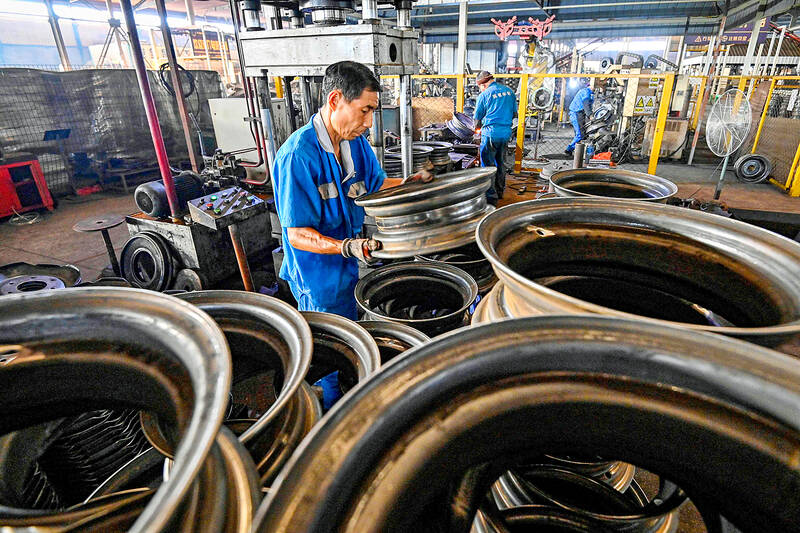China’s factory activity continued to contract while the services sector slowed last month, as Chinese policymakers prepared an emergency stimulus blitz to revive an economy facing challenges across the board.
The official manufacturing purchasing managers’ index (PMI) was 49.8, meaning the sector has now been in contraction since April last year, except for three months. The non-manufacturing PMI showed construction and services activity lost momentum, after growing in August.
The data released yesterday showed the economy remained in a slump before Chinese officials announced a broad package of measures aimed at reviving growth. The central bank last week cut key interest rates and freed up cash for banks to boost lending, while the elite politburo pledged to support fiscal spending and stabilize the beleaguered property sector.

Photo: AFP
“I don’t think September macro data points are going to matter this time for markets,” abrdn Asia Ltd investment director Xin Yao Ng (黃新耀) said. “It’s all forward looking about what kind of fiscal stimulus comes out.”
The spotlight is now on what measures the Chinese Ministry of Finance might unleash, as officials from other arms of China’s economic universe implement measures to boost the property market and rate cuts.
Reuters reported the Ministry of Finance is planning to issue two trillion yuan (US$285.2 billion) worth of special sovereign bonds this year, with half devoted to boosting consumption.
If Beijing needed more reason to draw a line under its post-COVID-19 pandemic slowdown, the Caixin PMI survey last month also released yesterday showed the country’s manufacturing activity unexpectedly fell into contraction while services expansion weakened to the slowest in a year. That private gauge has typically painted a rosier picture of the economy.
“The PMIs suggest that the economy is still weak, but there will be more focus on the impact of the strong stimulus measures announced over the past week,” United Overseas Bank Ltd (大華銀行) economist Woei Chen Ho (何為真) said. “The monetary and fiscal policy mix should prevent the economy from further weakening in the near-term.”
While the Chinese ministry has yet to make an official announcement, other monetary and economic authorities have begun to flesh out their part of the stimulus package over the last few days. The People’s Bank of China on Sunday said homeowners would be able to renegotiate terms with their lenders, a move that would reduce their mortgage burdens and potentially boost household spending, starting Nov. 1.
The Chinese National Development and Reform Commission, the nation’s economic planning agency, on Friday pledged full support to help private companies overcome difficulties, while Chinese Premier Li Qiang (李強) at a Chinese State Council meeting on Sunday said that government agencies would accelerate the pace of implementing policies as they strive to meet annual goals, state broadcaster China Central Television reported.
Beijing’s ability to reach its target of about 5 percent GDP growth was increasingly in doubt after data showed activity cooled across the board in August.
“The State Council responds to the politburo who demands for increasing government investment,” said Australia & New Zealand Banking Group Ltd chief economist for greater China Raymond Yeung (楊宇霆), who expects the Chinese economy to grow 4.9 percent this year.
“The keyword here is ‘execution,’” Yeung said.

‘SWASTICAR’: Tesla CEO Elon Musk’s close association with Donald Trump has prompted opponents to brand him a ‘Nazi’ and resulted in a dramatic drop in sales Demonstrators descended on Tesla Inc dealerships across the US, and in Europe and Canada on Saturday to protest company chief Elon Musk, who has amassed extraordinary power as a top adviser to US President Donald Trump. Waving signs with messages such as “Musk is stealing our money” and “Reclaim our country,” the protests largely took place peacefully following fiery episodes of vandalism on Tesla vehicles, dealerships and other facilities in recent weeks that US officials have denounced as terrorism. Hundreds rallied on Saturday outside the Tesla dealership in Manhattan. Some blasted Musk, the world’s richest man, while others demanded the shuttering of his

ADVERSARIES: The new list includes 11 entities in China and one in Taiwan, which is a local branch of Chinese cloud computing firm Inspur Group The US added dozens of entities to a trade blacklist on Tuesday, the US Department of Commerce said, in part to disrupt Beijing’s artificial intelligence (AI) and advanced computing capabilities. The action affects 80 entities from countries including China, the United Arab Emirates and Iran, with the commerce department citing their “activities contrary to US national security and foreign policy.” Those added to the “entity list” are restricted from obtaining US items and technologies without government authorization. “We will not allow adversaries to exploit American technology to bolster their own militaries and threaten American lives,” US Secretary of Commerce Howard Lutnick said. The entities

Minister of Finance Chuang Tsui-yun (莊翠雲) yesterday told lawmakers that she “would not speculate,” but a “response plan” has been prepared in case Taiwan is targeted by US President Donald Trump’s reciprocal tariffs, which are to be announced on Wednesday next week. The Trump administration, including US Secretary of the Treasury Scott Bessent, has said that much of the proposed reciprocal tariffs would focus on the 15 countries that have the highest trade surpluses with the US. Bessent has referred to those countries as the “dirty 15,” but has not named them. Last year, Taiwan’s US$73.9 billion trade surplus with the US

Prices of gasoline and diesel products at domestic gas stations are to fall NT$0.2 and NT$0.1 per liter respectively this week, even though international crude oil prices rose last week, CPC Corp, Taiwan (台灣中油) and Formosa Petrochemical Corp (台塑石化) said yesterday. International crude oil prices continued rising last week, as the US Energy Information Administration reported a larger-than-expected drop in US commercial crude oil inventories, CPC said in a statement. Based on the company’s floating oil price formula, the cost of crude oil rose 2.38 percent last week from a week earlier, it said. News that US President Donald Trump plans a “secondary